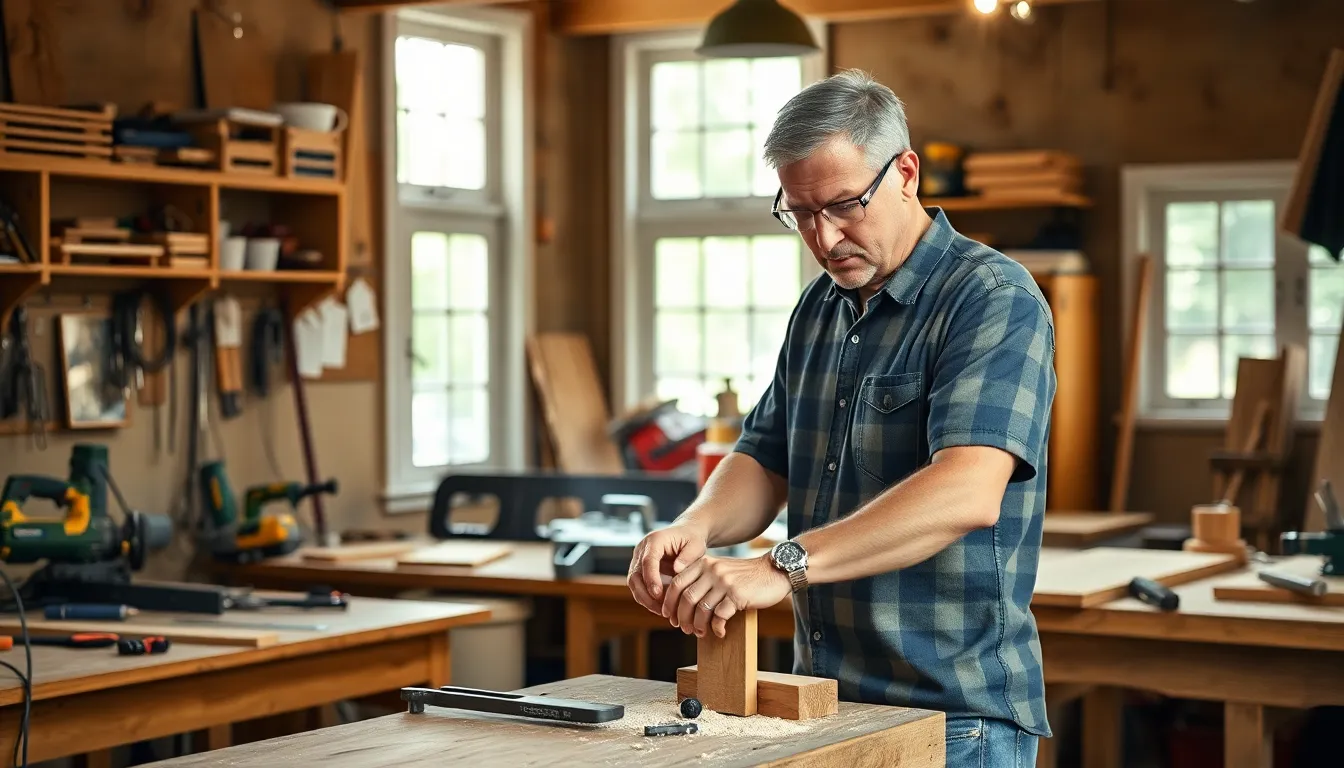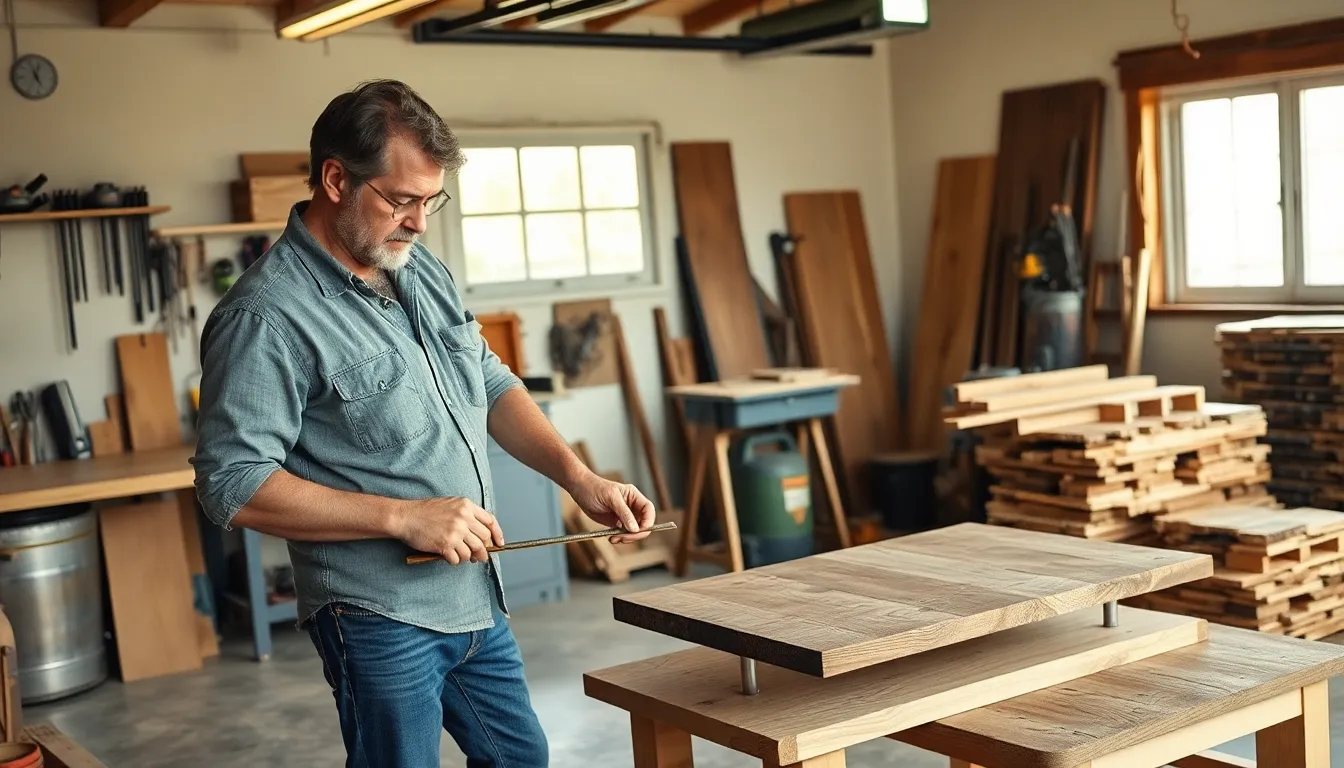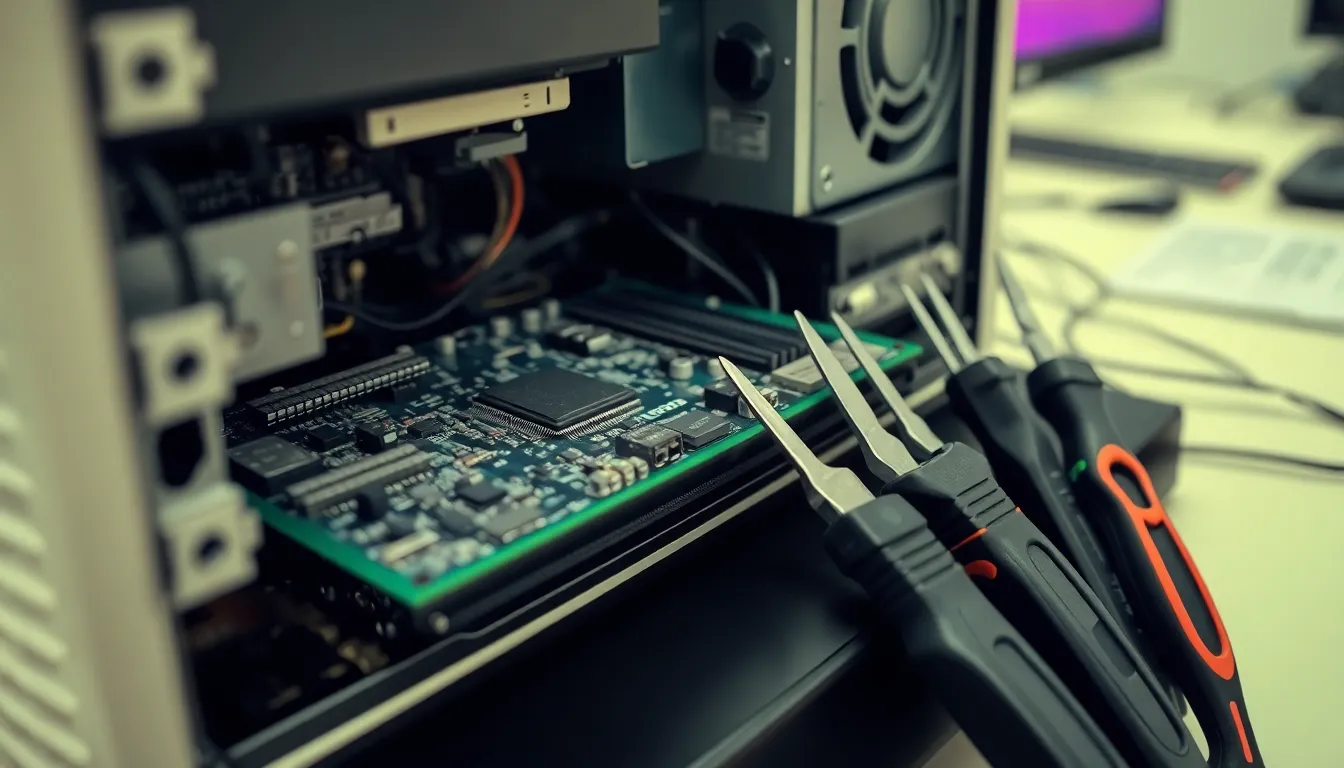Unleashing creativity at home can feel like a daunting task, but it doesn’t have to be. With a sprinkle of imagination and a dash of elbow grease, anyone can transform a corner of their home into a workshop wonderland. Whether it’s woodworking, crafting, or tinkering with electronics, the possibilities are endless. Who knows? One day you might be the proud owner of a handmade coffee table or a robot that vacuums the floor while you binge-watch your favorite show.
Table of Contents
ToggleCreative Home Workshop Ideas
Building garden furniture represents a practical and enjoyable project. Garden benches or tables enhance outdoor areas and provide additional seating.
Creating a personal crafting space showcases individual expression. A dedicated corner with storage for supplies makes crafting accessible and organized.
Experimenting with electronics can spark innovative ideas. Setting up a small electronics workstation encourages DIY projects.
Establishing a sewing area leads to the creation of bespoke clothing and home decor items. With a sewing machine and fabric on hand, creativity flows effortlessly.
Designing a woodworking station allows for the fabrication of custom pieces. Including essential tools like saws and drills ensures efficiency and safety.
Painting projects invite artistic exploration. Setting up an easel in a well-lit area inspires new works of art, from canvases to murals.
Utilizing repurposed materials for art projects can be both fun and sustainable. Collecting items like glass jars or wooden pallets encourages recycling and creativity.
Incorporating a small library with books on various subjects sparks motivation. Having resources on hand helps learn new skills and techniques independently.
Setting time aside for regular workshops with family or friends fosters collaboration. Group projects can lead to unique creations while strengthening bonds.
Overall, these creative ideas help transform any space into a dynamic workshop, encouraging productivity and passion while enjoying various hobbies.
Setting Up Your Space

Creating an effective workshop involves careful consideration of both location and tools. The right setup enhances productivity and supports various hobbies.
Choosing the Right Location
Select a space with ample natural light and ventilation. Garages, basements, or spare rooms often work well for workshops. Ensure the area has enough room for movement and storage. Proximity to utilities, such as electrical outlets and water, adds convenience. It’s important to assess the noise levels in the chosen space, especially if projects will generate sound. Dedicating a specific area helps minimize distractions.
Essential Tools and Equipment
Gathering essential tools lays the foundation for any workshop. Common tools include saws, drills, and hand tools for woodworking projects. A sturdy workbench provides a reliable surface for multitasking. Crafting supplies, like paper, scissors, and adhesive, support creativity in various projects. For electronics, a soldering iron and a multimeter are critical. Stock storage solutions are vital for keeping materials organized. Investing in quality tools boosts efficiency and ensures safety throughout the creative process.
Workshop Projects for Beginners
Creating projects at home can spark creativity and develop skills. Beginners can dive into a wide range of projects that provide hands-on experience.
Woodworking Projects
Woodworking projects offer satisfying challenges for newcomers. Simple items such as birdhouses or small stools can build foundational skills. Measuring, cutting, and joining wood become easier with practice. Beginners might also enjoy crafting picture frames or shelving units. Using reclaimed wood for these projects introduces sustainability into the process. Online tutorials provide step-by-step guidance for successful outcomes.
DIY Electronics
DIY electronics projects draw interest through innovation and functionality. Creating a basic LED circuit allows beginners to grasp fundamental principles. Building a simple radio or an alarm can introduce circuitry concepts. Beginners can benefit from kits available from various retailers, making it easy to source components. As experience grows, exploring projects like sensor-based systems can enhance understanding further. Experimenting with programmable devices, such as Arduino, encourages creativity in electronic design.
Intermediate Workshop Ideas
Exploring intermediate workshop ideas expands creativity and hones skills. Engaging in more complex projects fosters confidence in various crafts.
Metalworking Techniques
Metalworking techniques offer a unique blend of creativity and precision. Creating custom metal pieces like tool organizers enhances workshop efficiency. Techniques such as welding, fabrication, and metal shaping strengthen skills. They can start by building simple projects, like candle holders, before progressing to complex items like furniture. Utilizing tools like MIG welders, plasma cutters, and anvils ensures safety and quality craftsmanship. Local workshops or online resources provide instructions for learning essential techniques and best practices for anyone looking to master metalworking.
Sewing and Textile Projects
Sewing and textile projects encourage artistic expression through fabric manipulation. Intermediate sewists can create items like tote bags or simple garments, which refine their techniques. By working with different materials, including cottons and linens, they can explore unique patterns and textures. Incorporating embellishments such as embroidery or appliqué adds a personal touch. Access to online tutorials or local sewing classes enhances skill development. Building a collection of sewing tools, including rotary cutters, rulers, and specialty feet, improves the crafting experience.
Advanced Home Workshop Concepts
Advanced home workshop concepts expand creative possibilities and allow for unique project development.
Custom Furniture Creation
Transforming raw materials into custom furniture enhances personal spaces. Crafting items like dining tables or bookshelves can showcase individual tastes and creativity. Investing in quality wood, hardware, and tools ensures durability and aesthetic appeal. Techniques such as joinery and finishing techniques elevate craftsmanship, resulting in signature pieces. Online resources and tutorials offer guidance, helping woodworkers refine skills and explore innovative designs. Measuring, planning, and visualizing projects ensures efficient use of materials and optimal outcomes.
Maker Projects with 3D Printing
Utilizing 3D printing expands workshop capabilities, inviting creativity and innovation in project design. Custom designs, prototypes, and replacement parts can materialize directly from digital files. Software programs enable users to create original designs or modify existing templates. Filaments, including PLA or ABS, cater to varying needs based on strength and flexibility. Access to 3D printers, whether through local makerspaces or personal setups, promotes hands-on learning and experimentation. Engaging in community challenges or collaborative projects fosters skill development within the 3D printing realm.
Creating a home workshop opens up a world of possibilities for creativity and skill development. Whether it’s woodworking, sewing, or electronics, each project offers a chance to express individuality and enhance personal abilities. The right setup can transform any space into a productive haven where ideas come to life.
By investing time in organizing tools and materials, anyone can cultivate an environment that inspires innovation. Embracing collaborative projects can also strengthen bonds with family and friends, making the creative journey even more fulfilling. With the right mindset and resources, a home workshop can become a cornerstone of personal growth and enjoyment.




